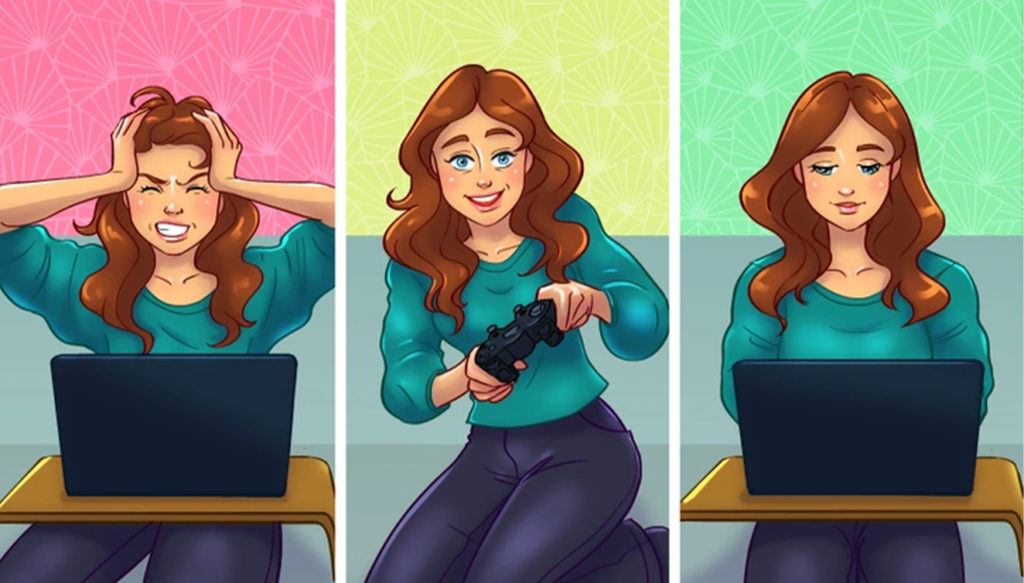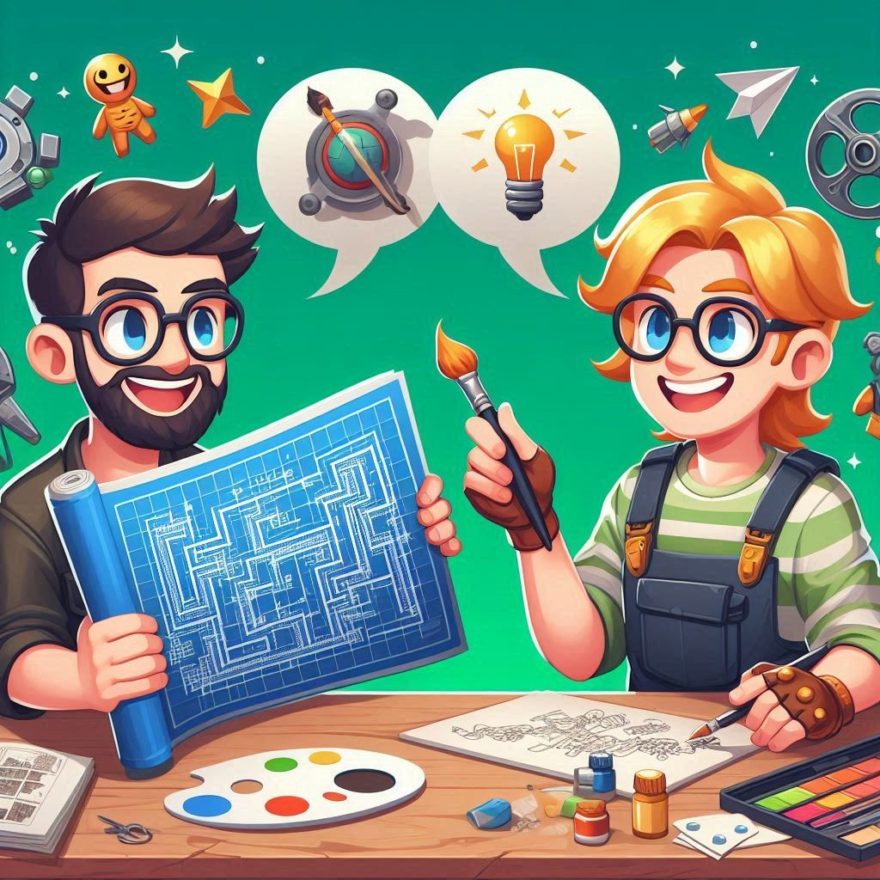Does Gaming enhance your mental and motor skills?

Video games are good for you!
As the adage goes, “Excess of everything is bad,” it is best to practise everything in moderation and to avoid showing excessive greed! Like that if you keep things in check video games can prove one of the best things happened to you! Video games are frequently viewed as a danger; many people believe that they cause antisocial behaviour, encourage violence, and keep youngsters indoors all the time instead of letting them play with their friends outside in the sunshine.
Another prevalent misperception involves other worries, primarily held by parents, such as eyes being continually exposed to radiation from TV screens or perhaps worry. Many people also think that playing video games is a waste of time. The majority of these issues can be directly addressed by straightforward parenting and by acknowledging that they can also be brought on by other media influences, such as books, movies, and television; however, regulating the kind of content that children are exposed to is a broad topic that is beyond the scope of this article today. Let’s talk about some positive sides of playing games for once and let other worries be there to get worried for tomorrow!?
The foundation for the development of more complicated motor skills is proficiency in gross motor skills (GMS). Enhancing these motor abilities may offer better opportunity for the growth of different perceptual, social, and cognitive abilities. The development and intervention effects of the GMS are not suitable for many children with non-typical development, nevertheless.
Video games have been shown to involve manual skill development in addition to cognitive skill development. For education or training providers, the ability of video games to build a wide range of abilities is intriguing, especially when attempting to teach difficult-to-engage groups of people.
It has been shown that playing video games enhances problem-solving skills, hand-eye coordination, spatial awareness, and speed.
Role-playing and strategy-based video games improve the problem-solving abilities of adolescents. Children who play video games of any kind display enhanced creativity. Given how important timing is in video games, they can help players develop their timing abilities.
Puzzle games can help players develop their organisational abilities, and resource management is a crucial ability for video games because many of them provide players a certain number of resources that must be rationed in order to win. Last but not least, playing video games teaches users how to operate their equipment. Despite what most people think, video games may be an effective teaching tool. In the late 1980s, physical and occupational therapists began employing straightforward video games to treat patients with a variety of ailments, including physical, learning, or emotional impairments, as well as cognitive issues following stroke and/or brain injury.
This article is not solely based on various annotations and references from various studies; I also considered a number of field studies and observations to draw the conclusion that games have the following beneficial effects.
Fostering a feeling of ADVENTURE. Games provide players vast worlds to explore; whether realistic or cartoonish, levels and hidden objects are a mainstay of video games. Players discover that by fully exploring a level, they can gain additional bonuses, free items, additional lives, or even access to a brand-new planet. The players are encouraged to explore and walk around in the comfort of your living room (where you can keep an eye on them) by offering them a prize.
Dedicated gamers are typically interested in the game’s plot. Thus their LANGUAGE instruction.. Games offer narratives that help the user become more invested in the game and their virtual avatar. Language control is essential because some games are totally centred around a particular plot.
Placing the correct shape in the correct hole is the first logic-based toy that is given to a baby at birth, but games also offer puzzles that are considerably more sophisticated. This develops a strong SENSE of LOGIC. But there is a new twist: in order to move further, you MUST solve the problem. Games help players gradually improve their problem-solving abilities by presenting easier difficulties at initially and progressively more difficult ones as they go. The player strives to solve puzzles in the best possible ways and expects it. Additionally, puzzle and problem-solving abilities are sometimes taught under duress, such as when players must figure out a challenge before being attacked, before time runs out, or in a variety of other ways. Players learn problem-solving techniques through games.
Similar to competitive sports, most games demand a certain level of talent to play and a significant amount to master. For someone to become exceptionally skilled in a particular video game (like StarCraft or Street Fighter), they must put forth focus, practise, and effort. However, the game itself pushes players to compete with one another in order to put their talents to the test.
Gamers naturally attempt everything at their disposal and take advantage of game glitches in order to best overcome the game since they are constantly looking for the simplest solution to complete a challenge. This is – “Pushing the limits” Gamers have a reputation for solving issues in relatively basic ways and investigating ridiculously complex solutions if they promise a quick fix. Playing video games teaches gamers to experiment with every option they have.
GROUP activity participation. It’s much more interesting than a “movie night” and might be a terrific way to spend time with friends. It’s not precisely a sociable pastime to watch a movie, whether it’s at home or in a cinema. Even though you may be in the same space as other individuals, conversing or exchanging stories would be bothersome and disruptive for the action itself. But in video games, even those who aren’t playing can contribute, make fun of other players’ mistakes, and even offer helpful advice or past experiences.
Action games may improve eyesight and perhaps aid in the treatment of amblyopia, or “lazy eye.” Improves VISUAL Abilities. One eye’s vision is worse than the other in amblyopia. The ailment is typically treated by requiring the patient to cover their good eye with an eye patch, but researchers at Nottingham University discovered that playing some video games might accomplish in one hour what eye patches take 400 hours to do. First-person shooter video games have been shown to enhance visual skills by expanding the brain’s ability to spread attention over a variety of events. Gamers are more adept at sifting through information and identifying targets in a cluttered situation than non-players. Their field of vision is larger, and they are better able to monitor various moving things inside it. When it comes to normal vision, gamers outperform non-gamers by a wide margin, especially when it comes to contrast sensitivity, which affects daily tasks like reading the newspaper and is crucial in low light situations (like seeing at night or in fog).
Whether you like it or not, the multi-billion dollar video game business is increasingly dictating trends in technical development. The BlueRay format, motion controls, audio surround systems, and virtual reality are a few examples. All of these innovations started out in the gaming industry before spreading to other industries. That is “Investigating NOVEL technologies.” By nature, gamers are the first to use new technologies, and they have the opportunity to test and evaluate them before they are mass produced for other commercially successful products.
Enhances HAND-EYE COORDINATION in general. Playing video games can hone your hand-eye coordination and motor abilities. Researchers from Iowa State University found that playing video games for three hours a week helps surgeons do minimally invasive surgery with fewer errors. Compared to their non-gaming peers, doctors who played games completed tasks more quickly. A video game was developed to aid trainee surgeons in warming up before entering the operating theatre as a result of the study.
Playing games also can boost your chance to lead to a new CAREER Choice. I can personally attest to this. Games provide a wide range of job options: People who typically work at a game development studio include 2D artists, 3D artists, animators, graphic designers, marketers, salespeople, movie makers, game designers, musicians, sound engineers, sound FX mixers, programmers, quality assurance officers, writers, scriptwriters, business development managers, data scientists, voice actors, actors, camera crew, and accountants.
One thing unites all these individuals: A love of video game!
Similar Articles
-

The Difference Between Game Art and Game Design You Should Know 06-14-2024
Introduction to Difference Between Game Art and Game Design When you pick up a video…
-

A CAREER IN GAME DESIGN, POWERED BY THE ASIAN INSTITUTE OF DESIGN 05-29-2024
Is there a success formula for a game to occupy a special place in our…
-

A Visual Feast: Unravelling the Spectacular World of “Everything Everywhere All at Once” 11-22-2023
In a world filled with blockbusters and high-budget spectacles, there occasionally emerges a cinematic gem…
-

Unveil the Face of Creativity – Asian Institute of Design’s Official Mascot Design Competition! 08-11-2023
Are you an artist with a passion for education, animation, design, or gaming? Here’s your…